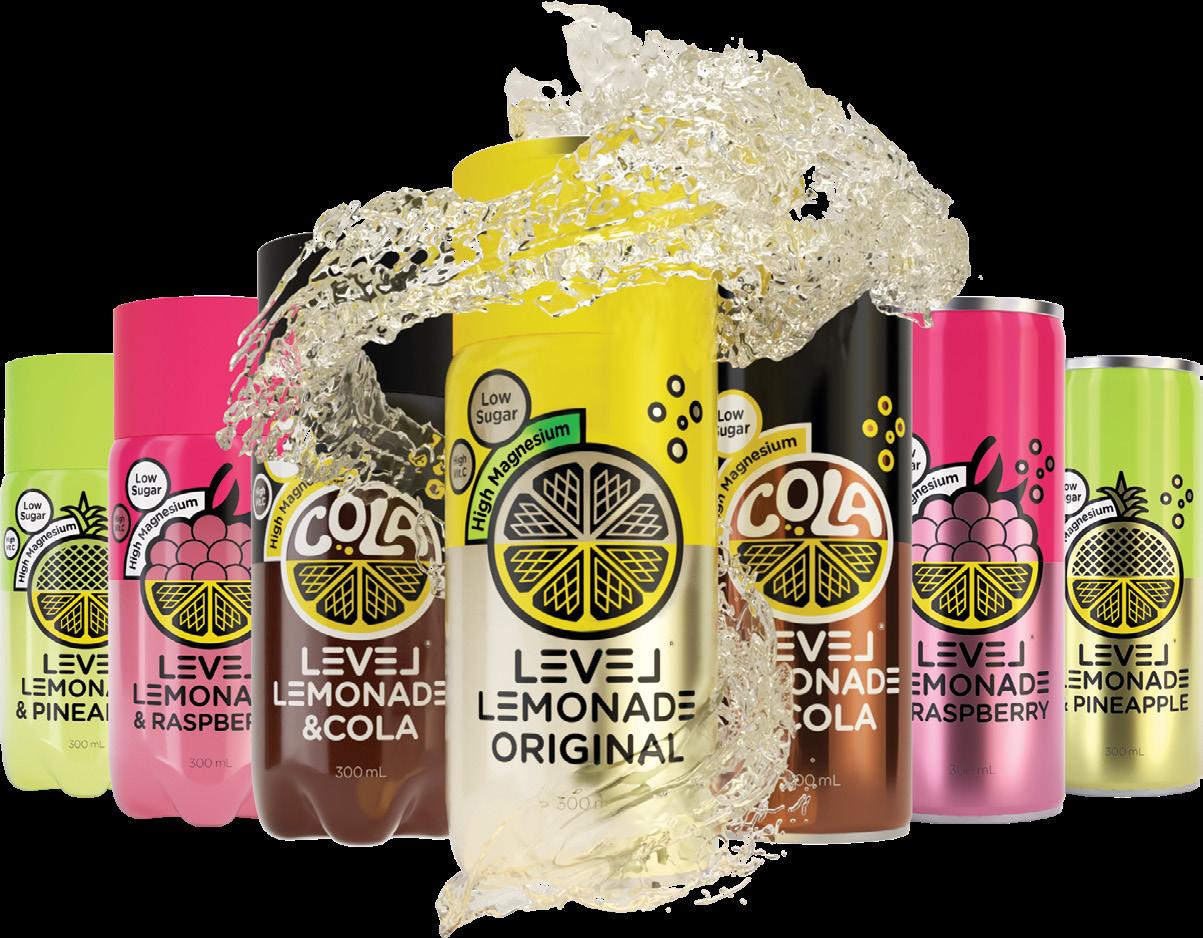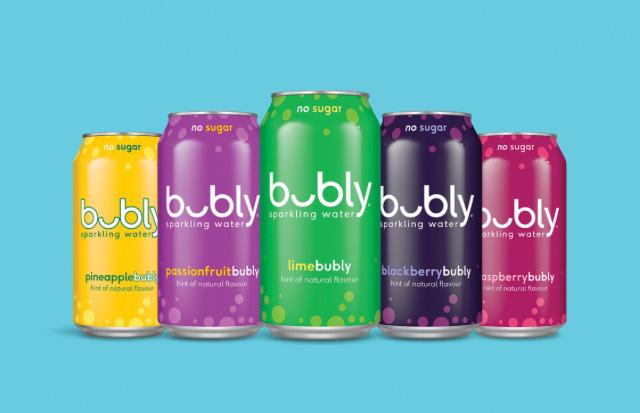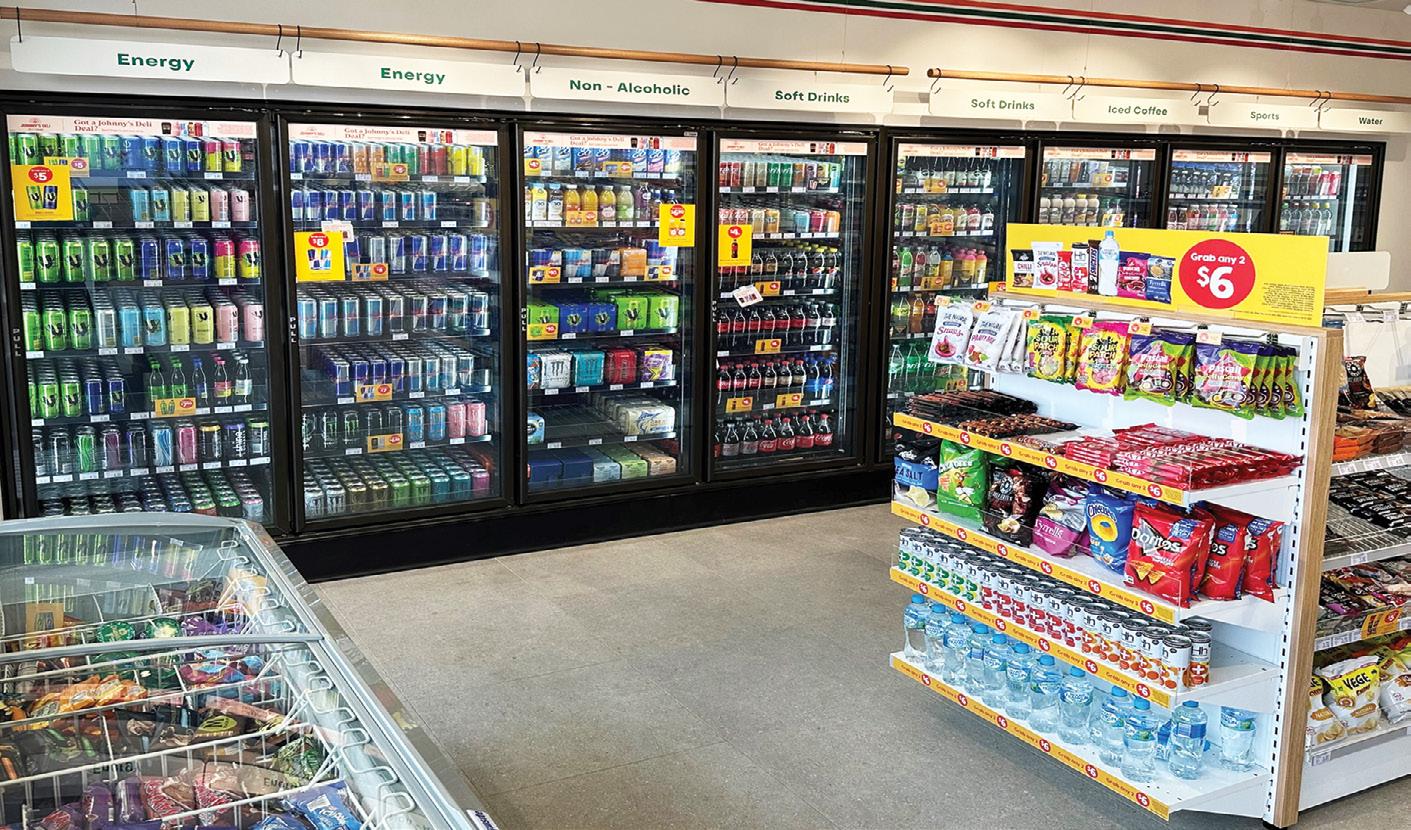
8 minute read
FEATURE: CARBONATED BEVERAGES
Hydration innovation
A predicted summer of heatwaves is welcome news for the beverage market, particularly in the convenience channel, but brands shouldn’t rest on their laurels in this highly competitive category.
-Words Claire Hibbit
WHEN IT COMES to carbonated beverages, consumers are seeking flavour innovation at an accelerated speed and frequency.
In fact, innovation has driven the carbonated beverages market in recent years, as it quickly adapts to consumers’ evolving tastes towards healthconscious options.
Consumers are expecting manufacturers to provide the next solution, if it tastes good, is healthier for you, and ticks those boxes; a portion of the market will undoubtedly follow.
– Simon Rathbone, Head of Sales, Noosa Beverages
And demand for these better-for-you flavour formulations and nootropic variants is showing no signs of slowing.
“Our customers love innovation in beverages, no matter what the segment,” explains Rob Kirby, Product Area Lead, 7-Eleven Australia.
Increasingly, consumers are wanting a functional or health benefit with their drinks.

“There has been a noticeable move away from full sugar drinks, with customers shifting into the no and low sugar varieties,” says Kirby. “In fact, zero and lowcalorie drinks in most cases now sell more than their regular counterpart.”
According to Simon Rathbone, Head of Sales at Noosa Beverages, the company’s growth over the past few years has been strong in all channels as consumers demand a different experience, combined with value for money.
“We have also seen a shift back towards more boutique and unique brands like Wimmers Premium Soft Drinks, as well as consumers wanting to support Australian and locally made products.
“Consumers are expecting manufacturers to provide the next solution, if it tastes good, is healthier for you, and ticks those boxes; a portion of the market will undoubtedly follow,” he says.
Finding the right formula
Key to success in the highly competitive and impulsive carbonated beverages market is staying ahead on flavour differentiation.
According to Asahi Beverages, its top-performing carbonated drinks in the convenience sector are led by Mountain Dew, which has seen a growth of around 30 per cent in value over the past year. This is followed by Solo with an increase of over 16 per cent and Pepsi Max, which has seen more than 10 per cent growth.
Over the past year, Asahi Beverages has launched several innovative beverages featuring functional energy ingredients and health-conscious options across various categories, not just in soft drinks.
According to the company, its most notable launches include Mountain Dew Major Melon, which it says became the number one selling innovation in total soft drinks within convenience outlets. Dew Major Melon has not only an energetic design and flavour but also zero sugar.
Additionally, Asahi Beverages rolled out Solo Lemon Lime (Zero Sugar) and Solo 50th birthday packs (limited edition memorabilia packs bringing to life some of Solo’s most iconic moments over the last 50 years), catering to what the company describes as “consumers’ increasing demand for flavourful yet health-conscious options”.
“While zero-sugar options are among the fastest-growing sub-segments in the soft drink industry, their adoption in convenience settings has been comparatively slow. However, we have observed higher sales volumes can be attained with flagship brands such as Solo Zero Sugar or through engaging flavour innovation like that found in Mountain Dew Major Melon.”
Asahi Beverages says it’s excited to introduce Vibe, a “great-tasting soda range with benefits”, as the next launch in the convenience sector. It has also rolled out first-to-market initiatives targeted specifically for convenience outlets as customer-first approaches and exclusive promotions surge.
For instance, Mountain Dew Major Melon and Gatorade Green Apple were both exclusively in 7-Eleven stores ahead of wider distribution. Similarly, Pepsi Max Soda Shop was released in BP stations around three months before becoming available in the broader market.
Noosa Beverages has also recently launched its first new flavour in 10 years under the Wimmers Premium Soft Drinks brand; Pink Hibiscus, edging on botanicals and ensuring it was made with natural flavour.
“The launch and the pursuing sales have been fantastic,” says Rathbone of the new Pink Hibiscus. “It has gained the attention of consumers and competitors, it’s certainly a very different product in the carbonated soft drinks market, it also makes a wonderful mixer with any white spirit on the hot balmy summer nights.”
Sustainable solutions
The move by consumers towards more environmentally sustainable products is also leading beverage manufacturers and convenience retailers to rethink product formats and packaging.
A report released by Monash Business School’s Australian Consumer and Retail Studies (ACRS) research unit last year found Australian consumers want sustainable products and are increasingly looking for more environmentally conscious shopping options.

More than half (52 per cent) of the 1000 Aussie shoppers surveyed for the retail monitor report Spotlight on Sustainability, said they were giving more thought to the social and environmental impact of their purchases before they buy, and are even willing to pay more for products that are ethically produced.
“Making consumers aware and keeping them informed about carbon footprint, sustainability, and social responsibility is growing in consumers’ minds,” says Rathbone.
7-Eleven’s Kirby notes a growing trend in drinks moving into cans rather than bottles.
“We believe portion control, sustainability, and usage occasion are some of the reasons why customers are choosing cans over bottles,” he says.
Recently, supplementary sports drink brand LeVeL Beverages has announced it is introducing 300ml cans to its core range of products, which are currently available in bottles.
Available in more than 3000 stores nationwide including Coles Express and On The Run, LeVeL Beverages’ range of LeVeL Lemonade is a better for you soft drink, available in seven flavours; Original, Pink Grapefruit, Raspberry, Orange, Ginger, Pineapple, and most recent flavour, Cola.
“According to our market research, 63 per cent of Australians prefer a fizzy drink on-the-go in a can over PET bottles,” says LeVeL Beverages Director, Chrish Graebner.

“Functional, and better for you beverages continue to lead the way in the category, and brands need to strike the right balance of these elements in their formulations for today’s consumer,” says Graebner, who says P&C remains LeVeL Lemonade’s most important channel, accounting for 80 per cent of sales.
Graebner says LeVeL Beverages has been on a solid growth journey, selling four million bottles since the brand’s inception.
“In the last quarter alone, we sold about 30 per cent more than the same time last year. We estimate in-market sales of LeVeL lemonade were more than $4,000,000. And this is just the beginning.”
Graebner now has set his sights on taking the company even higher, launching a crowd-funding campaign to grow the loyalty and amplify the brand throughout its key consumer support base.
Capitalising on impulse
Beverages play a key role in driving traffic to stores, therefore capturing the shopper’s attention as soon as they walk through the door is critical.
To do this, retailers should ensure that the customer flight path to purchase is clear, with easy-to-read signage. POS that is bright, engaging, and interrupts the shopper journey, can help assist in the shopper’s decision-making process, or even entice them to make an impulse purchase.
“Every retailer has their own opinion on what works for them in their area,” says Rathbone.
“Speaking specifically about Noosa Beverages’ range of products, I would say it’s important to have locally produced and 100 per cent Australian owned product at the forefront and making it a feature within store.
“Being predominately Queensland-based, tourists and visitors are more open to, and like, trying locally manufactured products, something different to the international brands that consumers have had for years, they will always search those common brands out, but you can make your site unique by working with us and supporting Australian made and owned brands.”

Local brands can be nimble, and international brands can tap into their global ranges and expertise to drive innovation, but this has to align to local tastes and seasonality to be successful.
– Rob Kirby, Product Area Lead, 7-Eleven Australia
As a highly impulsive category, soft drinks have always been viewed by convenience retailers as a way to generate associated sales with food and fuel. Therefore, strategic bundling and value creation is essential. To do this, retailers need to ensure associated combo products are placed in prominent locations on the path to purchase and are easily visible and accessible to encourage the uptake.
While shoppers will always seek value for money in-store, Kirby believes retailers need to understand their customers beyond price.
“We know that our customers are feeling the squeeze on their discretionary income with cost-of-living pressures. It’s all about providing value that matters to the individual customer and building loyalty to encourage co-buys and return visits in a highly competitive market.
“It’s not all about price, as innovation is another form of value. Local brands can be nimble, and international brands can tap into their global ranges and expertise to drive innovation, but this has to align to local tastes and seasonality to be successful.
“Retailers are becoming more sophisticated with merchandising and trade planning, so I would encourage more collaboration between suppliers and retailers on how to maximise opportunities through prominent store assets, cobuy opportunities including meal deals, and even store-based clusters where relevant.
“Whether activations are price, innovation, or loyalty-based, knowing your customer intimately and partnering collaboratively is what we see as being key to the success.”



